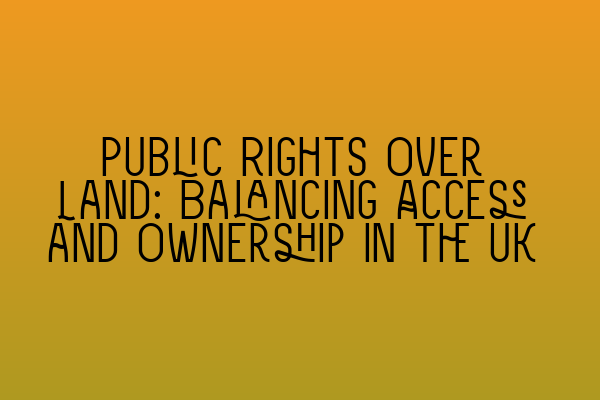Public Rights Over Land: Balancing Access and Ownership in the UK
In the United Kingdom, there exists a delicate balance between the rights of the public to access land and the rights of private landowners to control and enjoy their property. This interplay between public rights and private ownership has been a subject of legal debate and scrutiny for many years. In this blog post, we will explore the concept of public rights over land in the UK, examining the legal framework, key considerations, and the challenges faced in striking a fair balance between access and ownership.
To truly understand the complex nature of public rights over land, it is important to delve into the legal foundation upon which they are based. In the UK, public rights over land are primarily governed by legislation such as the Countryside and Rights of Way Act 2000, the Commons Act 2006, and the Highways Act 1980. These statutes provide the framework through which individuals and communities can access and enjoy certain areas of land, including public highways, footpaths, bridleways, and common land.
One of the fundamental aspects of public rights over land is the concept of “right of way.” A right of way is a legal right that allows individuals to pass over or through another person’s property. These rights can take various forms, such as footpaths, where pedestrians have the right to travel on designated routes, or bridleways, which permit the passage of horse riders and cyclists. By providing access to public spaces, these rights of way facilitate recreational activities, promote connectivity, and foster a sense of community.
However, it is crucial to note that public rights over land are not absolute and must be balanced with the rights of private landowners. Landowners have the right to control and enjoy their property, and this includes the ability to limit access to their land. Landowners can exercise their rights by erecting fences, installing gates, or placing restrictions on the use of their private property. Balancing public access and private ownership is essential to ensure the preservation of individual property rights while enabling public enjoyment of communal spaces.
Determining the extent of public rights over land can be complex and is often subject to legal interpretation and dispute. It is crucial for individuals to be aware of the specific rights applicable in their area and to respect the boundaries set by landowners. Any disputes or disagreements regarding public access to land should be resolved through proper legal channels and with due respect for the rights of all parties involved.
The delicate balance between public rights and private ownership necessitates the need for ongoing legislation, policy development, and judicial decisions. It is imperative to ensure that the legal framework surrounding public rights over land remains up to date and responsive to societal needs. Recent legislative changes, such as the Commons Act 2006, have sought to enhance public access and protect valuable public spaces while still acknowledging the rights of private landowners.
In conclusion, public rights over land in the UK are a crucial component of our legal system, ensuring that individuals and communities have access to public spaces and enjoy the benefits of outdoor activities. However, respect for private property rights is equally important to maintain a fair and balanced legal framework. Striking the right balance between access and ownership requires ongoing dialogue, legal expertise, and an understanding of the rights and responsibilities of both the public and private landowners.
For more information on related topics, we invite you to explore the following articles:
– Misrepresentation in Contracts: Unveiling Deceptive Practices
– A Closer Look at SQE Contract Law Syllabus
– SQE Contract Law: Analyzing Landmark Cases and Influential Judicial Decisions
– Contract Law for Services: Key Considerations and Best Practices
– Understanding Contractual Capacity: Rights and Limitations
At SQE Property Law & Land Law, we have a team of experienced solicitors who specialize in navigating the complex legal landscape surrounding public rights over land. If you require legal assistance or have any questions regarding this topic, please do not hesitate to contact us. We are here to provide comprehensive and professional advice to help you understand your rights and obligations in relation to public access and private ownership of land in the UK.
